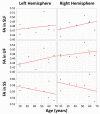Effects of Lifelong Musicianship on White Matter Integrity and Cognitive Brain Reserve
- PMID: 33419228
- PMCID: PMC7825624
- DOI: 10.3390/brainsci11010067
Effects of Lifelong Musicianship on White Matter Integrity and Cognitive Brain Reserve
Abstract
There is a significant body of research that has identified specific, high-end cognitive demand activities and lifestyles that may play a role in building cognitive brain reserve, including volume changes in gray matter and white matter, increased structural connectivity, and enhanced categorical perception. While normal aging produces trends of decreasing white matter (WM) integrity, research on cognitive brain reserve suggests that complex sensory-motor activities across the life span may slow down or reverse these trends. Previous research has focused on structural and functional changes to the human brain caused by training and experience in both linguistic (especially bilingualism) and musical domains. The current research uses diffusion tensor imaging to examine the integrity of subcortical white matter fiber tracts in lifelong musicians. Our analysis, using Tortoise and ICBM-81, reveals higher fractional anisotropy, an indicator of greater WM integrity, in aging musicians in bilateral superior longitudinal fasciculi and bilateral uncinate fasciculi. Statistical methods used include Fisher's method and linear regression analysis. Another unique aspect of this study is the accompanying behavioral performance data for each participant. This is one of the first studies to look specifically at musicianship across the life span and its impact on bilateral WM integrity in aging.
Keywords: cognitive reserve; diffusion tensor imaging; fractional anisotropy; musicianship; white matter integrity.
Conflict of interest statement
The authors declare no conflict of interest.
Figures


References
Grants and funding
LinkOut - more resources
Full Text Sources
Other Literature Sources

